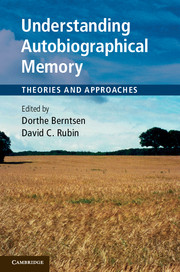Book contents
- Frontmatter
- Contents
- List of figures
- List of tables
- List of contributors
- Preface
- Acknowledgements
- 1 Introduction
- Part I Approaches to the study of autobiographical memory
- Part II Neural studies of autobiographical memory
- Part III Social and cultural aspects of autobiographical memory
- Part IV Development of autobiographical memory from infancy to old age
- Part V Evolution and basic processes of autobiographical memory
- 14 Evolutionary origins of autobiographical memory: a retrieval hypothesis
- 15 Spontaneous recollections: involuntary autobiographical memories are a basic mode of remembering
- 16 Autobiographical memory and future thinking
- Part VI Discussion
- Index
- References
16 - Autobiographical memory and future thinking
Published online by Cambridge University Press: 05 November 2012
- Frontmatter
- Contents
- List of figures
- List of tables
- List of contributors
- Preface
- Acknowledgements
- 1 Introduction
- Part I Approaches to the study of autobiographical memory
- Part II Neural studies of autobiographical memory
- Part III Social and cultural aspects of autobiographical memory
- Part IV Development of autobiographical memory from infancy to old age
- Part V Evolution and basic processes of autobiographical memory
- 14 Evolutionary origins of autobiographical memory: a retrieval hypothesis
- 15 Spontaneous recollections: involuntary autobiographical memories are a basic mode of remembering
- 16 Autobiographical memory and future thinking
- Part VI Discussion
- Index
- References
Summary
From the moment we wake up to the moment we fall asleep, we spend much time thinking about all sorts of events and situations that are yet to happen – an errand to run this afternoon, an appointment at the dentist tomorrow, the next lab meeting, a romantic dinner tonight, plans for the weekend, a job interview next month, to give just a few examples. Young adults may experience, on average, around sixty thoughts about the future during a typical day (i.e., one future thought every 16 minutes), and much of these thoughts probably serve important functions, such as planning and decision making (D’Argembeau, Renaud, and Van der Linden, 2011). The ability to imagine and plan for the future (here referred to as “future thinking”) is thus clearly a prominent feature of the human mind.
How do we mentally represent future events? What are our thoughts and mental images of the future made of? How are they constructed? The purpose of this chapter is to explore these issues. The first section reviews recent research that has revealed that the capacity to imagine future events is closely related to the capacity to remember past events. Next, I dig further into the nature of this relationship and consider the possible contribution of different kinds of autobiographical knowledge structures to the representation of future events. Finally, recent findings about the component processes underlying future thinking are presented and discussed.
Information
- Type
- Chapter
- Information
- Understanding Autobiographical MemoryTheories and Approaches, pp. 311 - 330Publisher: Cambridge University PressPrint publication year: 2012
References
Accessibility standard: Unknown
Why this information is here
This section outlines the accessibility features of this content - including support for screen readers, full keyboard navigation and high-contrast display options. This may not be relevant for you.Accessibility Information
- 38
- Cited by
